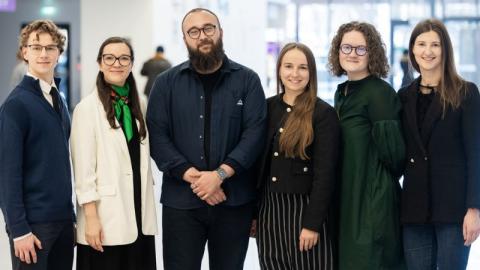5 EIT Health startups driving big data innovations in healthcare

Big data is transforming the healthcare landscape, offering new possibilities in patient care, diagnostics, and operational efficiency.
By leveraging vast amounts of health information, medical professionals can make more informed decisions, predict disease patterns, and improve patient outcomes.
As a key driver of healthcare innovation in Europe, EIT Health is dedicated to advancing the responsible and effective use of big data in healthcare. Through strategic funding, mentorship, and cross-sector collaboration, we support startups that are leveraging health data to transform patient care and healthcare delivery.
The role of health data in driving innovation
Health data encompasses a wide range of information, from electronic health records (EHRs) and genomic sequences to wearable device readings and real time patient monitoring. Startups are tapping into these data sources to develop predictive analytics models, enhance personalised medicine, and streamline healthcare operations.
Despite its potential, harnessing health data comes with challenges, including data privacy concerns, regulatory compliance, and interoperability between systems. However, with the right frameworks and innovations, the opportunities outweigh the obstacles, paving the way for a more efficient and patient-centric healthcare system.
EIT Health-supported startups making an impact with big data:
BLiiNK: Leveraging big data for digital well-being
BLiiNK is dedicated to transforming digital interactions into actionable health insights, promoting healthier screen habits to prevent chronic issues such as eye strain and musculoskeletal discomfort. BLiiNK employs AI-driven analytics and real-time monitoring to evaluate a user’s posture, screen distance, and blink rate. By processing these metrics locally on the PC, it provides tailored corrective actions to reduce discomfort, while also recommending targeted exercises for specific muscle groups and overall well-being.
Some key challenges to using data include ensuring data privacy under strict regulations like GDPR, driving user adoption in a fast-paced digital space, and securing early-stage funding in the competitive health tech sector. BLiiNK overcame these by designing a privacy-first app that operates entirely locally, giving users full control over their data.
CheckEye: AI-powered early detection for chronic diseases
CheckEye is dedicated to revolutionising early detection of chronic diseases through AI-powered retinal image analysis. By leveraging big data and AI, CheckEye aims to make diagnostics more accessible, prevent severe complications, and reduce the burden on healthcare systems.
CheckEye’s AI-driven platform analyses retinal images to detect diabetic retinopathy and other conditions in just 15 seconds. The system employs predictive analytics to assess health risks, achieving over 95% diagnostic accuracy. The AI model is trained on diverse datasets, with expert annotation provided by the Filatov Institute of Eye Diseases and Tissue Therapy in Odesa, Ukraine, ensuring clinically validated results. The impact has been undeniable.
- Over 5,000 screenings conducted in pilot programmes.
- Up to 30% of patients identified with previously undiagnosed conditions.
- Drastically reduced diagnostic time, improving access to early detection and reducing long-term healthcare costs.
BrainTrip: Addressing brain health with AI
BrainTrip aims to make brain health assessments accessible, objective, and scalable through AI-enhanced EEG technology. By enabling early detection of dementia, BrainTrip empowers general practitioners, clinics, and researchers with an easy-to-use and affordable screening tool, addressing the challenge that 75% of dementia cases go undiagnosed.
The solution achieves 95% diagnostic accuracy in detecting cognitive impairment. It offers a 30-minute cognitive assessment, significantly reducing the time compared to traditional 1–2 hour neuropsychological tests.
Longenesis: Using big data to provide personalised therapy and better outcomes
Longenesis, is committed to accelerating the time it takes for therapies to reach patients and enabling cross-border research through the power of data and applied AI models.
Longenesis harnesses the power of multi-channel and multi-source data, combining patient and healthcare provider-reported information with lab, diagnostic, and therapy data. This approach allows for the real-time identification of patients in need of specific therapies and personalised support throughout their treatment journey.
Owkin: Understanding complex biology through agentic AI
Owkin leverages AI to analyse vast patient datasets securely, uncovering insights from a variety of data modalities and sources. Through partnerships with top hospitals and researchers, Owkin is making strides in oncology, cardiovascular care, neurology, and immunology. The MOSAIC initiative is one of their key projects, aiming to create the world’s largest spatial multiomics dataset for cancer research. Owkin’s data includes clinical records, genomic sequencing, histology, and more, enabling them to improve diagnostics and speed up drug discovery with greater precision.
One notable achievement is MSIntuit® CRC, an AI tool that helps pathologists diagnose colorectal cancer more efficiently by streamlining MSI testing. This CE-marked product reduces lab workload, speeds up diagnosis, and improves patient care. Owkin has tackled regulatory hurdles and data privacy concerns by pioneering federated learning technology.




 Share this page
Share this page


